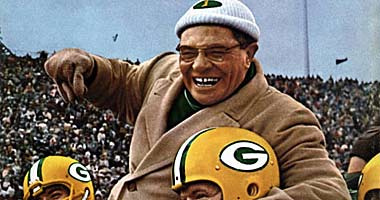“Winning isn’t everything, it’s the only thing.” – Vince Lombardi (attributed), 1965
 The Green Bay Packers and the Chicago Bears have played football against each other for ninety years. There have been 180 Packers-Bears games, with Chicago holding a 92-83-5 advantage. Most amazingly for a series covering so many battles over such a long period of time, the Bears’ 171 point overall lead in points scored comes to an average per game advantage of 17-16.
The Green Bay Packers and the Chicago Bears have played football against each other for ninety years. There have been 180 Packers-Bears games, with Chicago holding a 92-83-5 advantage. Most amazingly for a series covering so many battles over such a long period of time, the Bears’ 171 point overall lead in points scored comes to an average per game advantage of 17-16.
These stalwarts of the National Football League will meet at Chicago’s Soldier Field on Sunday afternoon to decide which team will advance to Super Bowl XLV to face the winner of the New York Jets-Pittsburgh Steelers game. It will be the the biggest Packers-Bears game ever.
Any exploration of the glorious history of this rivalry will feature some discussion of Vince Lombardi, the legendary coach of the Packers from 1959-1967. Lombardi won five NFL championships during these nine seasons, including the first two Super Bowl titles. The NFL’s championship trophy was renamed the Vince Lombardi Trophy in 1970 soon after he died of cancer at the age of 57. He remains a fascinating and distinctive figure in American cultural history. The recent and excellent HBO special, “Lombardi“, examined his life and impact. Much of the film was based on the book authored by David Maraniss entitled, When Pride Still Matter: A Life of Vince Lombardi.
In the book, Maraniss–my favorite writer of contemporary American history–details the origins of the quote that has been durably linked to Lombardi: “Winning isn’t everything, it’s the only thing.” Though associated with Lombardi-era Packers teams, the famous words were first publicly spoken in the 1953 movie flop, “Trouble Along the Way,” starring John Wayne and Donna Reed. Given that information, it might be surprising to learn that the line was not spoken by Hollywood tough-guy Wayne, but rather by an 11-year-old actress who played his spunky daughter. Maraniss further explained that the screenwriter included the now-famous quote in the script because he had learned of it from his agent, who had heard it spoken by another one of his clients, the UCLA football coach at the time, Henry “Red” Sanders.
Maraniss provided more background about the quote and touched on the ambivalence Lombardi and others close to him sometimes felt relating to how it was understood and applied:
…there is no doubt that Lombardi had the addiction [to winning] by 1965. After coming in second two years in a row, he vowed never to lose again, and redoubled his efforts to assure that he would not. He papered the locker room walls with motivational aphorisms, all variations on the themes of competition and success. One of those maxims later came to be regarded as the essence of his philosophy: “Winning isn’t everything, it’s the only thing.”
What exactly he meant by that, indeed whether he believed it or even said it, has been a matter of debate ever since. His critics blamed Lombardi for promoting a win-at-all-cost competitive pathology that led inevitably to Richard Nixon’s dirty tricksters at the Committee to Re-elect the President, whose 1972 headquarters featured a sign that read, “Winning in Politics Isn’t Everything, It’s the Only Thing.” Lombardi’s supporters insisted through the years that he was misinterpreted. What he said, or meant to say, they claimed, was that winning isn’t everything, it’s the only thing worth striving for, or winning isn’t everything, but making the effort to win is.
Making that effort on Sunday, and following in the storied traditions of these two great franchises, will be Packers such as Aaron Rodgers, Clay Matthews, and Charles Woodson and Bears such as Brian Urlacher, Julius Peppers, and Jay Cutler. As a lifelong fan of the Detroit Lions–a team that ritually loses to both Green Bay and Chicago once or twice a season–I do not have a strong personal rooting interest for this game. But I do have a favorite: Packers 17 Bears 16.




